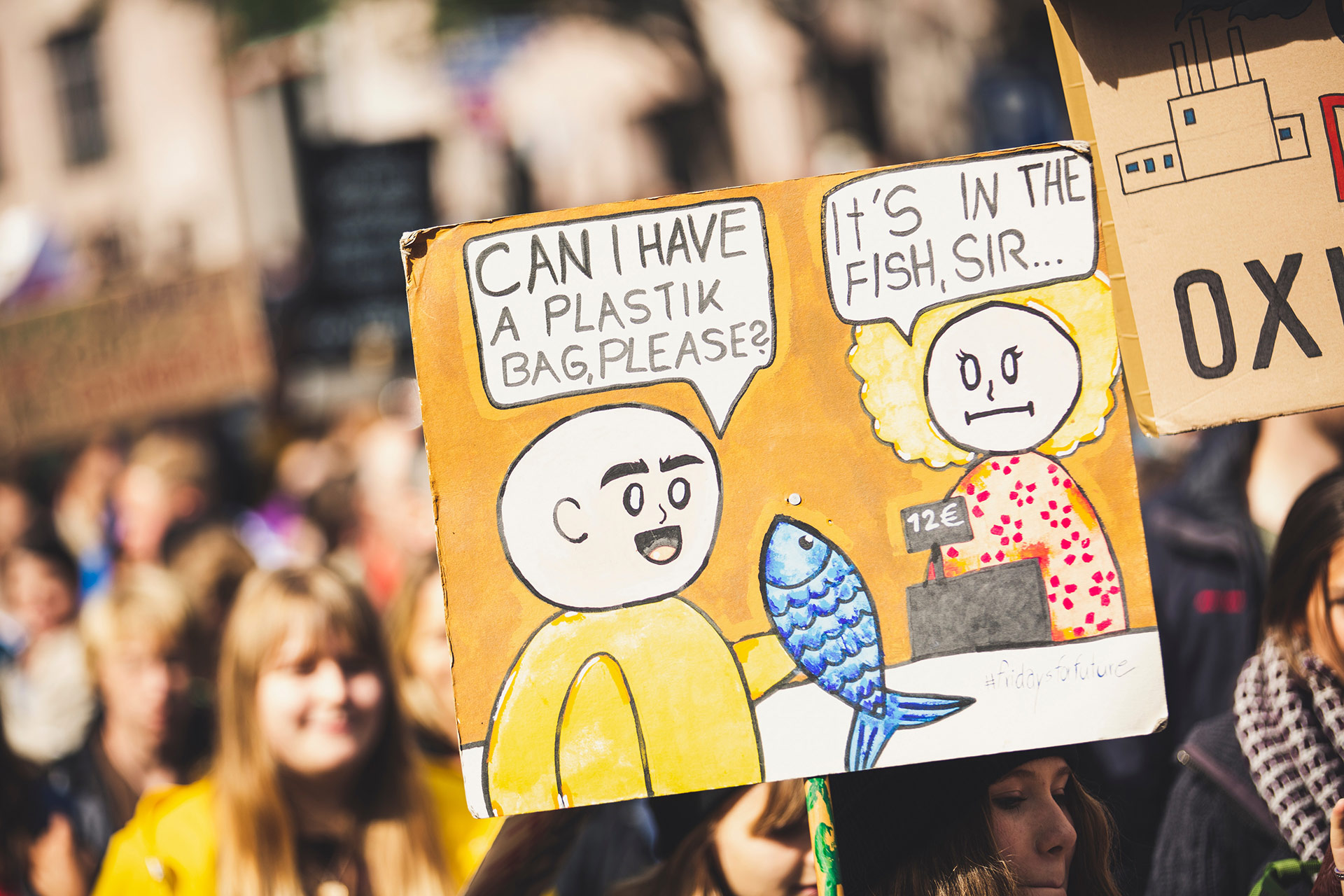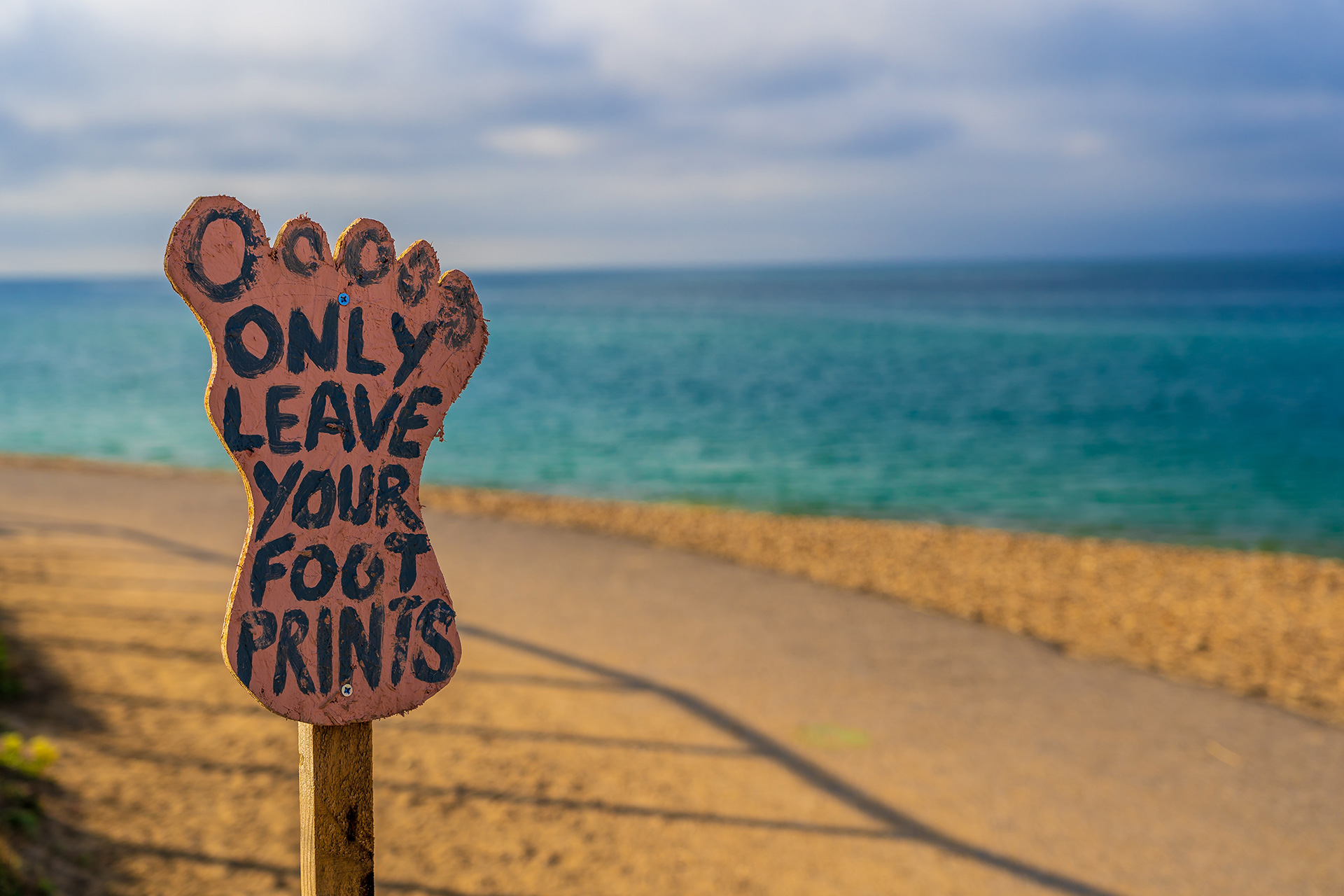The way is paved
Not only thanks to the pressure of civil organisations such as "Fridays for Future", politics is also gradually starting to show signs of progress. With the Sustainable Finance Action Plan³, the EU has defined standards (EU taxonomy) that make sustainability activities of financial institutions quantifiable. This is designed to finance change and steer capital flows towards sustainability. Companies that cannot meet the relevant criteria will no longer receive money on the European capital market. With a redefinition of the German Sustainability Strategy (DNS) 2021, the Federal Government wants to "set the right course for the Decade of Action".⁴ The recent decision of the Federal Constitutional Court is also a clear signal: Something has to change – now.
A new awareness
Environmental and climate protection has been a social standard for quite some time now. During the last few years, people have developed a growing awareness and feeling of responsibility for the environment, which is reflected, for example, in the emergence of zero waste shops, eco-labels and the sharing economy. According to the Zukunftsinstitut, the mega-trend Neo-ecology will shape the 2020s like no other.
"Environmental awareness is evolving from an individual lifestyle to a social movement. Sustainability from a consumer trend to an economic factor. And the climate crisis becomes the basis of a new, global identity," says futurologist Lena Papasabbas.⁵
In the new purpose economy⁶, consumers expect companies to take a clear stance on sustainability, and so do investors. A good reason for BlackRock to declare sustainability an investment standard in a letter addressed to investors.⁷

Talking green, acting dirty
Companies are well aware that they can sell more products using the environmental label and have been enticing customers with green promises for a long time. Krombacher, for example, promised at the beginning of the millennium to save one square meters of rainforest for every crate of beer sold. The company made a profit: In the first year of the campaign, sales rose by 8% to 460 million. Only about 0.3% of the sales revenue went to a WWF rainforest project; an area equivalent to about 0.01% of the African rainforest was protected.⁸
Multinational corporation Unilever wants to make the world a little better with its "Sustainable Living Brands" product range. In its campaign for its sustainable brands⁹ which include brands such as Dove, Omo, Rexona, Knorr and Lipton Tea, the company promises "Every U does good". In 2018, the named brands grew 46% faster than other brands for the fourth year in a row and were responsible for 70% of total sales growth. Unilever then goes on to interpret the "sustainability" of the brands as follows:
„Unilever’s Sustainable Living Brands are those that communicate a strong environmental or social purpose, with products that contribute to achieving the company’s ambition of halving its environmental footprint and increasing its positive social impact. While all of Unilever's brands are on a journey towards sustainability, our Sustainable Living Brands are those that are furthest ahead.”¹⁰
The brands are thus labelled "sustainable" with regards to their communication, while in terms of their actual content, they are only just on the way to achieving this. Meanwhile, Unilever continues to produce plastic packaging and still obtains palm oil for the production of many products from plantations in Indonesia, which are being investigated for illegal slash-and-burn farming.¹¹
But green lies don't travel far, as a campaign by Vattenfall in Hamburg to promote its electric car filling stations shows. The energy supplier decorated itself with the claim "Hamburg fuels green electricity", when in reality over ninety percent of the electricity produced by Vattenfall in Germany comes from burning coal. Most certainly also the electricity that flows through the charging stations. This earned the company harsh criticism, and it also cost it reputation. The posters with the green promises were covered up by Greenpeace.¹²
It's a matter of survival – for companies, too
These kinds of manoeuvres have worked well for a while: a landmark brand here, a social donation project there, and a nice sustainability report to go with it. That was all it took to satisfy corporate responsibility. But people, organisations and, increasingly, regulators are looking behind the green facade and demanding measures with real impact. What is the sustainability strategy? How do we want to position ourselves as a company in this context? How do we implement sustainability in the long term and anchor it in processes across all departments? These are the questions that companies need to answer.
The concept of Environment, Social, Governance (ESG) from the world of finance has established itself as a standard. It describes ecological and social areas in corporate management which are used as a basis for developing criteria for evaluating corporate responsibility. Up to now, the adherence to these standards was voluntary, but they are now becoming increasingly relevant for risk management.¹³
"Companies can contribute as part of their core business. We therefore encourage companies around the world to assess the impact of their actions, set ambitious targets and communicate their progress transparently," says Ban Ki-Moon, former UN Secretary-General.
Companies are responding and decorate their websites with the UN's Sustainable Development Goals. However, a study by Price Waterhouse Coopers shows:¹⁴
- 72% of companies talk about the Sustainable Development Goals
- 25% integrate them into their corporate strategy
- Only 14% mention specific goals
Not nearly enough momentum to handle the serious economic challenges in the face of the looming climate catastrophe. And the ecological catastrophe will also be an economic one if it hits the economy unprepared. "Sustainable", according to the Cambridge dictionary, means "able to continue for a long period of time". We can only achieve this by deliberately making entire business processes sustainable.
Sustainable is clever
Outdoor fashion supplier Patagonia has been setting a good example for years. Like no other player in the clothing industry, the company stands for sustainable management. "We are in business to save our home planet"¹⁵ ,is the corporate mission that is practiced at all levels. Patagonia is at its core an environmental activist that also sells outdoor fashion.
For a quarter of a century, the label has been using organic cotton exclusively and was a pioneer in the production of fleece jumpers from plastic bottles. In emotional Worn Wear® Stories,¹⁶ Patagonia communicates the value of recycled clothing instead of promoting buying new. The new brand campaign "Action works"¹⁷ asks people to save the world, not to buy jumpers. To do this, it offers opportunities to engage with organisations.
A clear attitude allows companies to operate in a focused way and take decisions that secure a long lifespan. This is proven by 40 years of successful management at Patagonia.

A ray of light when it comes to energy
Another successful example of healthy growth is that of Hamburg-based energy supplier LichtBlick. Instead of talking big green words like Vattenfall, the founders took action and launched a small company for green electricity about 20 years ago. Today, LichtBlick is Germany's largest green electricity provider with 1.7 million customers and supplies companies like Scandic and Globetrotter. LichtBlick Energy has a clear purpose: to make "climate neutral the new normal" by 2035. This goal cannot be achieved individually, so LichtBlick, like Patagonia, calls for collective action. Its collaborative attitude led the company to a groundbreaking business idea: In order to create a network in the decentralised digital energy market occupied by many providers, the company launched the IT platform "Swarm Conductor".¹⁸ Already, 1,000 plants for combined heat and power plants, batteries, electric cars and solar plants are linked through the platform, and the trend is rising. LichtBlick thus has the potential to decisively shape the entire green electricity market.
Companies that say one thing and do another are like people: We don't trust them. That is why the age of green talk and dirty action is over. It is at this point that brand management as a strategic tool makes a valuable contribution: in developing a purpose – the vision and mission – it asks the right questions, identifies core values and therefore the company's significance for a positive change in society.
An authentic brand first works on the inside and influences the service and product portfolio, which must be measured against the brand promise. Employees, too, will then put themselves at the service of the greater good and develop more motivation to achieve the defined brand goals. As a reinforcing element, communication becomes effective at all levels, promotes internal and external exchange, fosters collaboration and ultimately leads to sustainable results.
Sustainability must find its way into the substance of companies and transform them. This is essential for their credibility, and also secures their economic continuity through healthy growth. "The sooner companies explore the potential of this transformation for themselves, the more they will benefit from it in the future. Tomorrow's prosperity is based on new values - and a new concept of growth."¹⁹
And those who have the corresponding substance will also find the right words to communicate it convincingly.
More on the subject of purpose in our article "That makes sense!".
Would you like to exchange ideas with us on the subject or do you have a challenge? We are looking forward to your contact: call +49 611 . 238 50 10 or by eMail to kontakt(at)diefirma.de.
Sources
¹ https://www.un.org/sustainabledevelopment/decade-of-action/
² https://www.bund.net/service/presse/pressemitteilungen/detail/news/kommentar-fazit-zur-weltklimakonferenz-minimalkompromiss-in-madrid-wird-klimakrise-nicht-gerecht/
³ https://www.unpri.org/news-and-press/european-commission-releases-action-plan-for-financing-sustainable-growth-/2855.article
⁴ https://www.bmfsfj.de/resource/blob/174260/51385895309085c0ce567488920aca36/20210310-weiternetwicklung-dns-kurzfassung-data.pdf
⁵ https://www.zukunftsinstitut.de/artikel/der-wichtigste-megatrend-unserer-zeit/
⁶ https://www.capital.de/wirtschaft-politik/auf-dem-weg-in-die-sinnoekonomie
⁷ https://www.blackrock.com/corporate/sustainability/committed-to-sustainability
⁸ https://www.zdf.de/dokumentation/zdfinfo-doku/gruene-versprechen-wie-verbraucher-getaeuscht-werden-102.html
⁹ https://www.unilever.de/presseservice/news-and-features/2018/02112018.html
¹⁰ https://www.unilever.com/news/press-releases/2019/unilevers-purpose-led-brands-outperform.html
¹¹ https://www.unilever.de/presseservice/pressemitteilungen/2019/07102019.html
¹² https://www.greenpeace.de/themen/umwelt-gesellschaft/wirtschaft/vattenfall-will-sich-grunwaschen
¹³ http://www.nachhaltig-investieren.org/esg-environmental-and-social-governance.php
¹⁴ https://www.pwc.de/en/sustainability.html
¹⁵ https://eu.patagonia.com/gb/en/activism/
¹⁶ https://www.youtube.com/watch?v=4IyTXRfnYmQ
¹⁷ https://eu.patagonia.com/gb/en/actionworks/about/
¹⁸ https://www.smarter-service.com/2021/04/27/was-resiliente-unternehmen-stark-macht/
¹⁹ https://www.zukunftsinstitut.de/artikel/der-wichtigste-megatrend-unserer-zeit/
Image sources
Cover: Photo by ev on Unsplash.com
Content 1: Photo by Nick Fewings on Unsplash.com
Content 2: Photo by Markus Spiske on Unsplash.com
